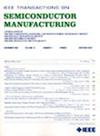Process Control in Semiconductor Manufacturing Based on Deep Distributional Soft Actor-Critic Reinforcement Learning
IF 2.3
3区 工程技术
Q2 ENGINEERING, ELECTRICAL & ELECTRONIC
引用次数: 0
Abstract
The quality of semiconductor fabrication processes is typically degraded by variations in the manufacturing environment, which can be suppressed by run-to-run (R2R) control schemes. The performance of controlling systems to the produce process which is always highly complex and nonlinear physical model thus is strongly associated with the controlling strategy. However, previous works focusing on less complex semiconductor fabrication processes or linear controlling strategy are both hard to extend the application scenario. A novel structure for a R2R control system based on a distributed form of deep reinforcement learning (DRL), namely, distributional soft actor-critic (DSAC) DRL with twin-value distribution learning, is proposed for multizone pressure control in the chemical mechanical planarization (CMP) process, which is one of the most crucial manufacturing processes for the fabrication of ultra-large integrated circuits (ICs). In addition, several optimization algorithms for DRL, such as twin value distribution learning, are applied, further improving DSAC DRL to enhance the control performance. Compared with other reinforcement learning (RL)-based controllers, the proposed RL control policy achieves better control performance when tested using a multizone CMP virtual metrology (VM) model based on long short-term memory (LSTM) and one-dimensional convolutional neural network (1DCNN) architectures. This deep neural network (DNN) VM model, which is applied for the first time here to test the proposed DRL-based R2R controller for semiconductor manufacturing, is designed to preserve the complexity and nonlinearity of the CMP process by using data recorded from a practical manufacturing process at an IC fabrication facility in Tianjin, China. The novel model-free controlling schemes combined with the new VM model can be used in different R2R application scenarios. Meanwhile the results achieved using the proposed DRL control strategy strongly support its potential application in modern industrial semiconductor manufacturing and offer practical guidance for the further development of CMP procedures.基于深度分布式软行为者评价强化学习的半导体制造过程控制
半导体制造过程的质量通常会因制造环境的变化而下降,而这种变化可以通过运行到运行(R2R)控制方案来抑制。生产过程是一个高度复杂的非线性物理模型,控制系统的性能与控制策略密切相关。然而,以往的研究主要集中在不太复杂的半导体制造工艺或线性控制策略上,都难以扩展应用场景。提出了一种基于分布式深度强化学习(DRL)的R2R控制系统结构,即具有双值分布学习的分布式软actor-critic (DSAC) DRL,用于超大集成电路(ic)制造过程中最关键的制造工艺之一化学机械平面化(CMP)过程中的多区域压力控制。此外,还应用了双值分布学习等优化算法,进一步改进了DSAC DRL,提高了控制性能。在基于长短期记忆(LSTM)和一维卷积神经网络(1DCNN)架构的多区域CMP虚拟计量(VM)模型中,与其他基于强化学习(RL)的控制器相比,所提出的RL控制策略获得了更好的控制性能。该深度神经网络(DNN)虚拟机模型首次应用于测试半导体制造中基于drl的R2R控制器,该模型旨在通过使用来自中国天津IC制造工厂的实际制造过程记录的数据来保持CMP过程的复杂性和非线性。新的无模型控制方案与新的虚拟机模型相结合,可用于不同的R2R应用场景。同时,所提出的DRL控制策略的结果有力地支持了其在现代工业半导体制造中的潜在应用,并为CMP程序的进一步发展提供了实践指导。
本文章由计算机程序翻译,如有差异,请以英文原文为准。
求助全文
约1分钟内获得全文
求助全文
来源期刊

IEEE Transactions on Semiconductor Manufacturing
工程技术-工程:电子与电气
CiteScore
5.20
自引率
11.10%
发文量
101
审稿时长
3.3 months
期刊介绍:
The IEEE Transactions on Semiconductor Manufacturing addresses the challenging problems of manufacturing complex microelectronic components, especially very large scale integrated circuits (VLSI). Manufacturing these products requires precision micropatterning, precise control of materials properties, ultraclean work environments, and complex interactions of chemical, physical, electrical and mechanical processes.
 求助内容:
求助内容: 应助结果提醒方式:
应助结果提醒方式:


